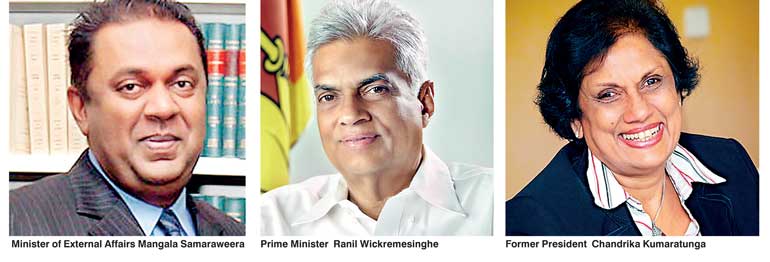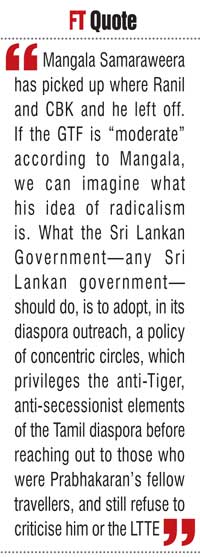Tuesday Feb 17, 2026
Tuesday Feb 17, 2026
Saturday, 27 June 2015 00:00 - - {{hitsCtrl.values.hits}}

As usual Sri Lanka’s cosmopolitan liberals have it wrong and that includes their most prominent personality, Minister of External Affairs Mangala Samaraweera. His embrace of the diaspora is wrong, not because the diaspora is diabolical but because Samaraweera’s embrace is indiscriminate.
Sri Lanka must welcome its diaspora or diasporas (plural). This is true of us as a country as well as of the Government of Sri Lanka. But the diaspora is not a homogenous entity. I do not mean that the Sinhala diaspora is good and the Tamil one is bad. What I do mean is that there are extremists in both the Tamil and Sinhala diasporas, just as there are moderates.
The Government and the country should open its doors and roll out the red carpet for the moderate, enlightened currents of both Tamil and Sinhala diasporas. The Government should go beyond that and strive to promote a truly Sri Lankan, i.e. Tamil and Sinhala diaspora, by building bridges between the moderates, the progressives, of both sides. (Indeed this is the policy I practiced with some success when I represented Sri Lanka in France.) Instead, what Samaraweera has done is to embrace the anti-Sri Lankan element of the Tamil diaspora. 
By anti-Sri Lankan, I do not mean anti-Mahinda Rajapaksa, because that is a matter of democratic political choice. Nor do I mean by anti-Sri Lankan, a generally violent discourse or disposition. After all, Suren Surendiran is a civilised chap and Fr. Emmanuel is quite affable, even warmly so. By anti-Sri Lankan I refer to an objectively verifiable political stance against Sri Lanka’s national interest.
The evidence is out in plain view in the interview that Suren Surendiran of the GTF gave the State-run Daily News, AFTER the conciliatory meeting with Foreign Minister Samaraweera and the resultant conversion to moderation on the part of the GTF. In it he spells out the four pillars of GTF policy. If I may mix metaphors, the smoking gun is in pillar number 3:
‘…Explaining the third pillar, he said: “The third is to actively lobby and create awareness within the international community, international institutions and governments regarding the injustices and alleged breaches of international laws, including international human rights and humanitarian laws that amounted to war crimes and crimes against humanity. Lobby for international independent investigations of both sides…Surendiran said the GTF intends to carry out the Four Pillar Strategy “with the help of the people of Sri Lanka, in the Diaspora and the international community including India.” He added that since 2011, the GTF has been progressing under this programme.’ (‘GTF to work on four pillar strategy’ Kathya de Silva-Senarath 16 June 2015 http://www.dailynews.lk/?q=local/gtf-work-four-pillar-strategy)
Problem with Ranil-Mangala-CBK model of reconciliation and peace-building
The problem with the Ranil-Mangala-CBK model of reconciliation and peace-building is that they have learnt nothing from their unsuccessful efforts of the dismal Decade of Appeasement 1995-2005. This is not to say that the Mahinda Rajapaksa administration got post-war peace-building and reconciliation right. Far from it: the first mistake made in that realm was to abolish the Secretariat for Coordinating the Peace Process (SCOPP) headed at the time by Prof. Rajiva Wijesinha.
The Ranil-CBK-Mangala troika made the gross mistake of thinking that peace could be arrived at without the total military defeat of the Tigers and more basically, the elimination of Prabhakaran. Given that peace could not be arrived at even during the much less intense JVP insurrection of 1986-1989 without the elimination of Wijeweera and the defeat of the JVP, it took a really high degree of obtuseness to assume that it would be different with a far more fanatical, successful and powerful LTTE. 
For its part the Rajapaksa administration made the opposite error. Just as Ranil-CBK-Mangala failed to realise that peace could not be achieved without a successful war; that a victorious war was a necessary precondition for peace; the Rajapaksa administration whose great merit was to recognise as their predecessors did not, that military victory was both possible and necessary, made the opposite error of assuming that a necessary condition was a sufficient condition. It thought that the victorious end of the war was a sufficient condition of a sustainable peace. It failed to realise that a process of peace-building was necessary, and that this peace-building required not only material reconstruction and development, not only de-mining and rehabilitation; but also political negotiation. It failed to understand that political negotiation, while a discredited tactic of appeasement when practiced in wartime by Ranil-CBK, was however, a necessary post-war practice and prerequisite for a sustainable, durable peace.
Ranil-CBK-Mangala strove to achieve peace by talking to the wrong people
Ranil-CBK-Mangala strove to achieve peace by talking to the wrong people: the fascist, fundamentalist Tigers and their fellow-travellers. They could and should have worked out a political project with the anti-Tiger/non-Tiger Tamil groups and caught the Tigers in a politico-military pincer, but they did not.
They could have implemented the 13th Amendment instead of wasting time and political capital with the union of regions packages of 1995 and 1997, the Liam Fox agreement and the CFA, the Solheim mediation, the PTOMS, etc. They could have appointed an interim administration within the 13th Amendment and installed a coalition of progressive anti-Tiger Tamil groups which had worked with the UNP earlier and knew CBK from her SLMP years. But they did not.
For their part, the Rajapaksa administration could have done what President Putin successfully did in Chechnya with Ramzan Kadyrov, and empowered their ally Douglas Devananda in 2009, as the war was won and before the TNA recovered. Instead it opted for a (hyper-securitised) developmentalist strategy which had as a political component, a vain effort to rebuild the SLFP in the north and east.
Interestingly, CBK and MR administrations had the same option and made the same mistake: they both had an anti-Tiger, anti-secessionist Tamil partner which they had inherited from the Premadasa-Ranjan Wijeratne years, but they failed to play that card. CBK preferred to talk to the fascist Tigers (through the Norwegians) even after they tried to kill her and instead blinded her in one eye.
The MR administration correctly understood the fascist character of the Tamil Tigers and defeated them, but having done so it strove in the post-war phase, to operate politically in the north without any identifiable Tamil partner and strategic ally. Having made that mistake, the Rajapaksa administration compounded it by allowing the default option to fail, in that the dialogue with the TNA broke down and stayed suspended.
Mangala Samaraweera has picked up where Ranil, CBK and he left off
Mangala Samaraweera has picked up where Ranil and CBK and he left off. If the GTF is “moderate” according to Mangala, we can imagine what his idea of radicalism is. What the Sri Lankan Government—any Sri Lankan government—should do, is to adopt, in its diaspora outreach, a policy of concentric circles, which privileges the anti-Tiger, anti-secessionist elements of the Tamil diaspora before reaching out to those who were Prabhakaran’s fellow travellers, and still refuse to criticise him or the LTTE.
No Government should embrace those who, even after dialogue, boast that one of the pillars of their policy is to lobby the international community including governments, for international investigations into war crimes and crimes against humanity!
The basic task of any Foreign Minister and Foreign Ministry should surely be to oppose, refute, rebut and defeat those diaspora elements who threaten our national sovereignty by lobbying for international war crimes inquiries against Sri Lanka.
If only in his capacity as this country’s Minister of External Affairs, Mangala Samaraweera should be far more discriminating in whom he chooses to partner with in external affairs.